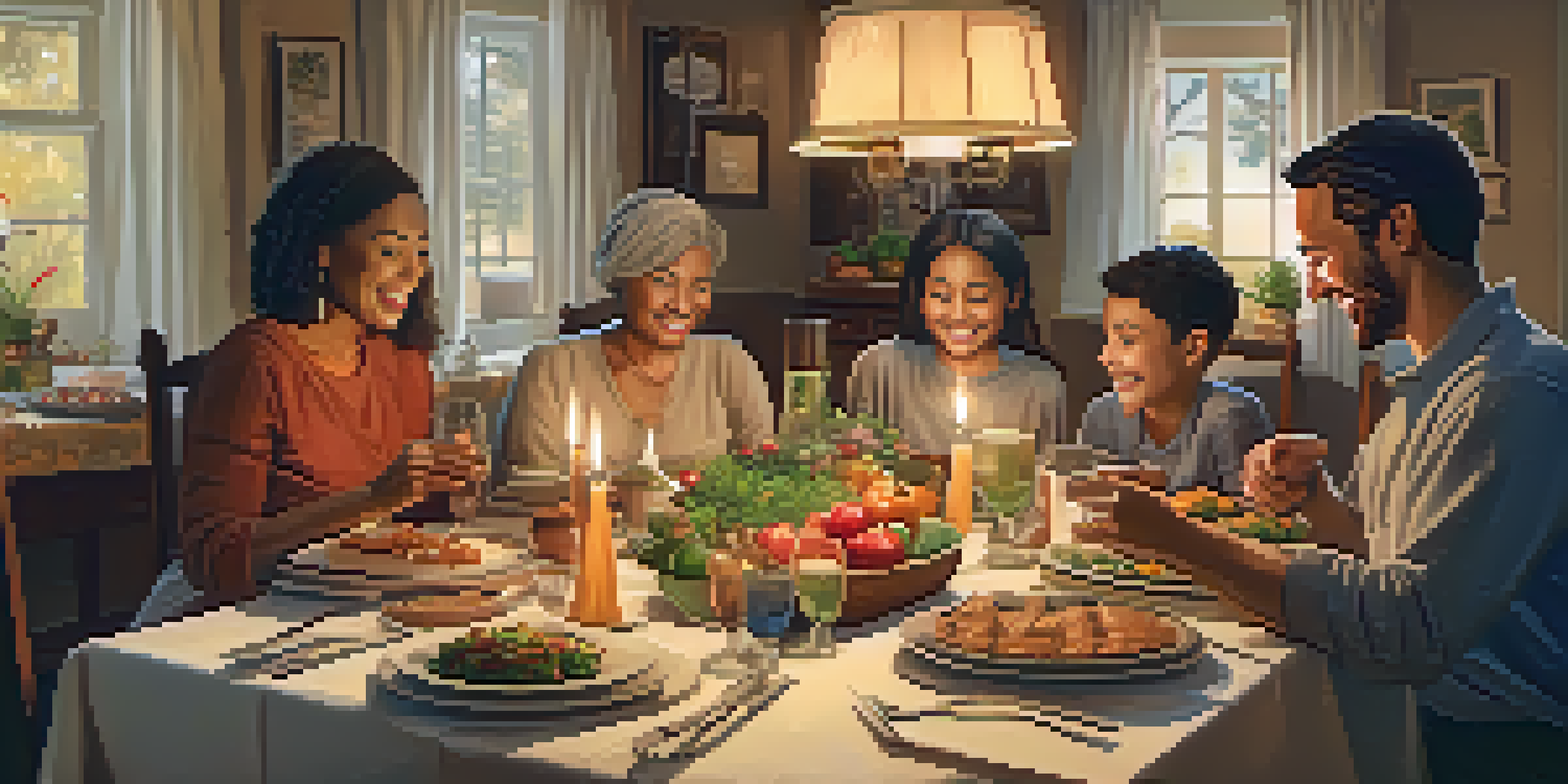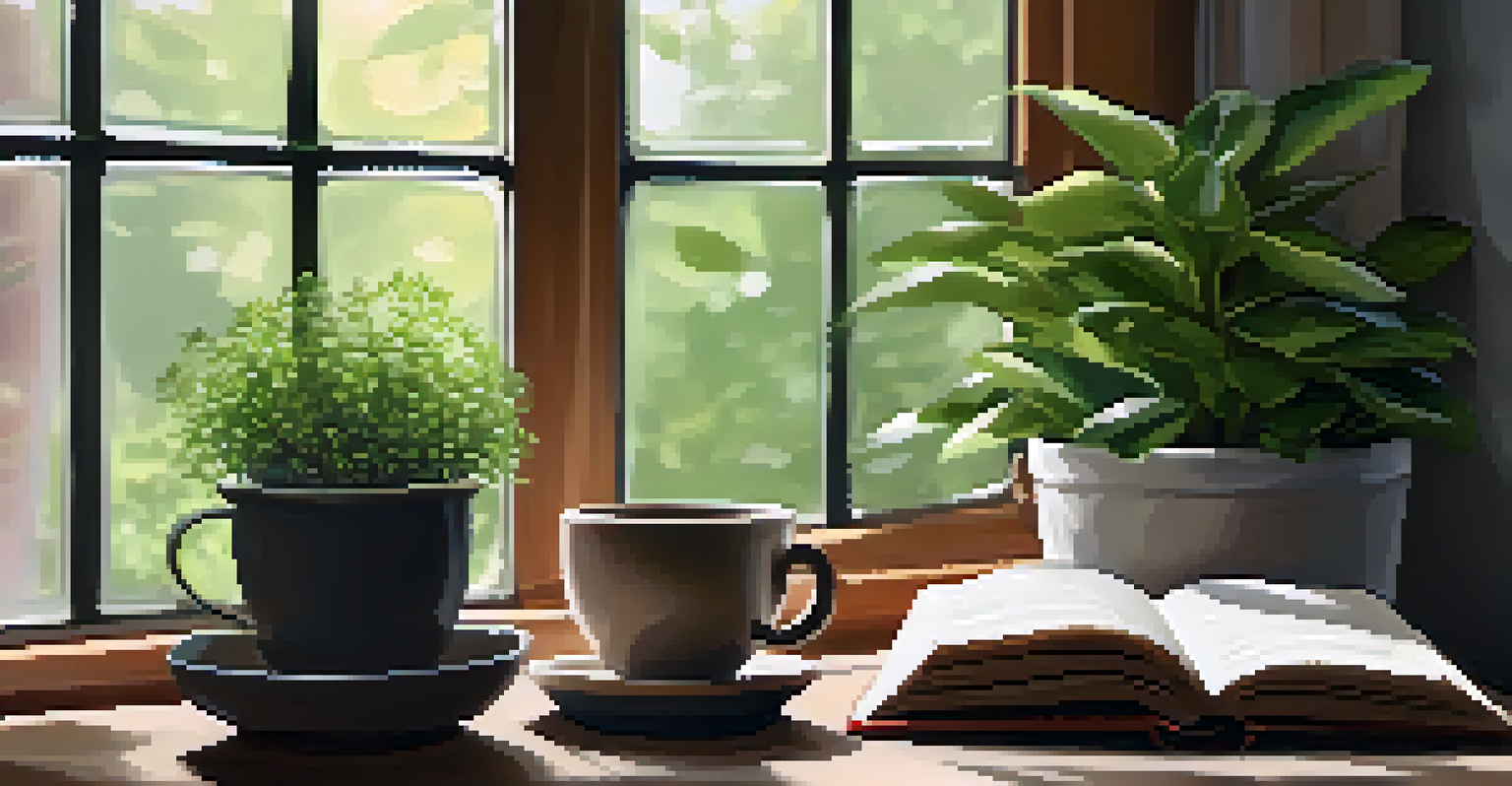The Connection Between Rituals and Personal Identity Formation

Defining Rituals and Their Role in Our Lives
Rituals are structured, repeated actions that hold significant meaning for individuals and communities. They can range from daily habits, like morning coffee, to elaborate ceremonies such as weddings. These practices provide a sense of stability and continuity, helping us navigate through the complexities of life.
Rituals are the formulas by which harmony is restored.
When we engage in rituals, we often find comfort and connection, both to ourselves and to others. They serve as anchors, reminding us of our values and beliefs. Through these actions, we create a shared language and understanding with those around us, reinforcing our social bonds.
Moreover, rituals can help mark significant transitions in our lives, such as graduations or birthdays. They allow us to pause and reflect on our growth, contributing to our sense of identity. By participating in rituals, we actively engage in the process of defining who we are.
How Rituals Shape Our Personal Identity
Personal identity is a multifaceted concept shaped by experiences, beliefs, and relationships. Rituals play a crucial role in this formation by providing a framework through which we can express ourselves and our values. They often reflect our cultural background, beliefs, and individual preferences.

For example, consider the ritual of family dinners. This simple act reinforces family bonds and shared values, allowing individuals to express their identity within a familial context. Each meal becomes a canvas where stories, traditions, and personal narratives are painted, enriching our understanding of who we are.
Rituals Provide Stability and Meaning
Engaging in rituals helps us find comfort and connection, offering a sense of stability amidst life's complexities.
Through the repetition of rituals, we also create a sense of belonging. Engaging in these practices with others fosters connections that further solidify our identities. The more we participate in rituals, the more they become intertwined with our self-perception.
The Psychological Benefits of Rituals
Engaging in rituals can provide a sense of control and predictability in an unpredictable world. This psychological benefit is especially important during times of stress or change. For example, during a challenging period, returning to familiar rituals can offer solace and stability.
Rituals are the way we express our beliefs and values, giving shape to our lives and connections.
Rituals also promote mindfulness, encouraging us to be present in the moment. When we engage in a ritual, whether it's lighting a candle or saying a prayer, we create a space for reflection and introspection. This practice can enhance our emotional well-being and deepen our understanding of ourselves.
Additionally, rituals can be a source of comfort in grief or loss. They provide a structured way to remember and honor loved ones, helping individuals navigate their emotions and find closure. In this sense, rituals become a vital part of our healing process, reinforcing our identity as we cope with change.
Cultural Variations in Ritual Practices
Rituals vary significantly across cultures, reflecting unique values, beliefs, and histories. For instance, while some cultures celebrate rites of passage with elaborate ceremonies, others may have more subdued practices. These differences highlight the rich tapestry of human experience and identity.
By observing and participating in diverse rituals, we gain insights into different ways of understanding identity. This exposure can broaden our perspectives and foster empathy, allowing us to appreciate the nuances of others' experiences. It also encourages us to reflect on our own rituals and what they signify in our lives.
Rituals Shape Personal Identity
Through repeated actions, rituals allow us to express our values and beliefs, reinforcing our sense of self and belonging.
Furthermore, the interplay between culture and personal identity is a fascinating dynamic. As we navigate our individual identities, we often incorporate elements from various cultures, creating a unique blend that reflects our personal values and experiences.
Rituals in Contemporary Life
In today's fast-paced world, rituals may seem outdated or less relevant. However, they continue to play an essential role in our lives, often adapting to modern contexts. From social media rituals to weekly family game nights, these practices remain crucial in shaping our identities.
Contemporary rituals often blend tradition with innovation. For example, a wedding might incorporate cultural elements while also embracing personal touches that reflect the couple's unique story. This fusion highlights how rituals can evolve while still maintaining their core purpose of identity formation.
Moreover, the rise of virtual communities has given birth to new rituals that connect people across distances. Whether it’s online book clubs or virtual family gatherings, these practices help maintain relationships and reinforce shared identities, proving that rituals are as relevant today as ever.
Personal Reflection and Rituals
Personal reflection plays a crucial role in understanding the significance of rituals in our lives. Taking time to identify which rituals resonate with us can enhance our self-awareness and personal growth. Journaling or meditating on our experiences can help clarify our values and beliefs.
Additionally, reflecting on the impact of rituals can reveal how they shape our identities over time. For example, revisiting childhood rituals may elicit nostalgia and remind us of our roots, while new rituals can signify our evolving selves. This exploration deepens our connection to our past and present.
Cultural Variations Enhance Understanding
Diverse rituals across cultures enrich our perspectives, fostering empathy and encouraging reflection on our own practices.
Ultimately, finding meaning in our rituals empowers us to create a more authentic identity. By consciously engaging in practices that resonate with us, we can cultivate a sense of self that is true to our values and experiences, enriching our lives on multiple levels.
The Future of Rituals and Identity
As society continues to evolve, so too will rituals and their role in identity formation. The future may bring new practices that reflect changing values and technologies, such as virtual reality rituals or community-building through social media. These innovations could expand our understanding of identity in exciting ways.
However, amidst these changes, the fundamental purpose of rituals—building connections and fostering a sense of belonging—will remain constant. As we adapt to new circumstances, the core human need for identity and community will drive the development of new rituals.

Ultimately, the relationship between rituals and personal identity will continue to be a dynamic interplay, reflecting the diverse experiences of individuals and cultures. As we embrace the future, we can ensure that our rituals remain meaningful and relevant, helping us navigate the complexities of identity in an ever-changing world.